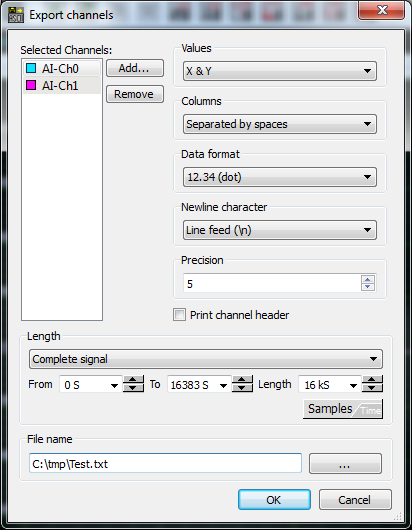 SBench 6 supports some different file format that can be used for data export and import. A few of these file formats can also be used to directly store data when doing long time streaming mode. This allows to operate on the acquired data with 3rd party products without the need to export data separately.
SBench 6 supports some different file format that can be used for data export and import. A few of these file formats can also be used to directly store data when doing long time streaming mode. This allows to operate on the acquired data with 3rd party products without the need to export data separately.
Available Export Formats
These export formats are currently supported. Please contact us if you need additional export formats.
- SBench 6 (*.sb6dat) This is the native SBench 6 data format which includes all details of the acquired data, Timestamps and ABA samples as well as detailed information on the data scaling, names and descriptions. The SBench 6 data format is the default format for streaming as it is optimized for fast data storage, contains all signal and setup information and also contains data preview information.
- SBench 5 (*.dat) This is the file format of SBench version 5. SBench 5 files can be read and written giving access to previously stored data in the new SBench 6 software as well as third party products that already have import or export filters for this file format. The file format is open to public.
- MATLAB (*.mat) SBench 6 offers a direct export into MATLAB files. These data files can directly be opened with MATLAB and data can be examined and displayed within this professional math package. The generated MATLAB files are compatible to all current versions of MATLAB.
- Pure Binary (*.bin) The pure binary data format just contains the multiplexed binary data as it is acquired by the hardware. A lot of third party products can directly read and write binary data with universal import filters. The binary data format is therefore an easy way to exchange data with other products without the need of generating new import or export filters.
- Wave (*.wav) The wave file format is an international standardized file format for storing audio and A/D sample data within a file also containing basic scaling information as sampling rate or vertical range. It is based on the Resource Interchange File Format (RIFF) specification and is supported by nearly all measurement and analysis software on the market as well as a lot of freeware audio tools.
- ASCII (*.txt) ASCII files are the simplest way to exchange data. Each sample is printed as a readable character having the great advantage that data can be viewed and edited even with simple text editors. Nearly all available data acquisition and analysis software is able to handle ASCII files in different formats. ASCII as printed text format offers a huge variety of different value printing formats.
- VCD (*.txt) The Value Change Dump is an ASCII-based format for digital data dumps. It can be read by various VHDL simulators and kernel tracers. The data file is a fully readable ASCII file consisting of a header section, a variable definition section, a dumpvars section for initial values of all variables and the value change section.